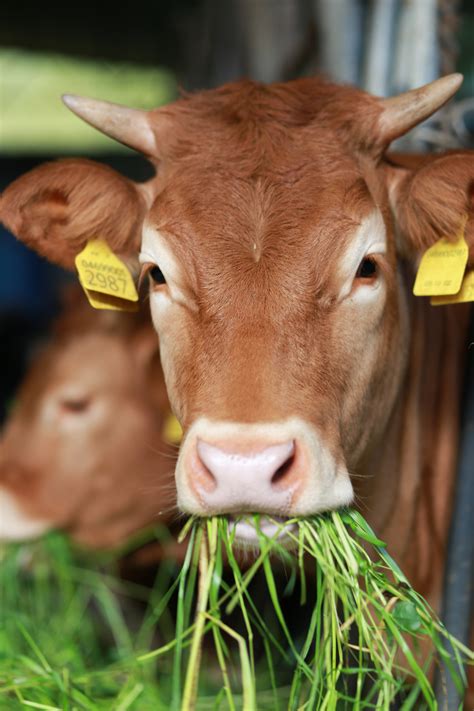7 Tips To Make Your Cow's Diet Perfect Today

Ensuring your cows receive a balanced and nutritious diet is crucial for their overall health and productivity. A well-planned diet not only promotes optimal growth and milk production but also contributes to the overall well-being of your livestock. Here are seven expert tips to help you create the perfect diet for your cows, fostering their health and happiness.
1. Understand Nutritional Requirements

The foundation of a successful cow diet lies in understanding their unique nutritional needs. Cows require a balanced mix of carbohydrates, proteins, fats, vitamins, and minerals to thrive. Different life stages, such as growth, lactation, or maintenance, have varying nutritional demands. Consult with a veterinarian or a livestock nutritionist to determine the specific requirements for your cows based on their age, breed, and production goals.
2. Forage First

Forage, including grasses and legumes, should be the cornerstone of your cow's diet. High-quality forage provides essential fiber, promotes rumen health, and supports efficient digestion. Aim to offer a variety of forages, such as pasture, hay, or silage, to ensure a diverse nutrient profile. Consider the forage's nutritional value and ensure it meets the cow's energy and protein requirements.
3. Supplement with Grains

While forage is vital, supplementing with grains can provide an additional energy boost, especially during periods of high milk production or rapid growth. Grains like corn, barley, and oats are excellent sources of carbohydrates and can be easily digested by cows. Introduce grains gradually and monitor their intake to prevent digestive issues.
4. Vitamin and Mineral Supplements

Vitamins and minerals are essential for various bodily functions and overall cow health. Offer free-choice mineral blocks or include a mineral supplement in their diet to ensure they receive adequate amounts. Vitamins A, D, and E are particularly important for immune function and reproductive health. Consult with a nutritionist to determine the appropriate supplement dosage based on your cow's specific needs.
5. Water, Water Everywhere

Access to clean and fresh water is non-negotiable. Cows require ample water for digestion, milk production, and overall bodily functions. Ensure water troughs are easily accessible, clean, and free from contaminants. Monitor water intake, especially during hot weather or periods of high milk production, as dehydration can quickly lead to health issues.
6. Feed Management and Quality Control

Implementing proper feed management practices is crucial for maintaining cow health and preventing nutritional deficiencies. Regularly analyze the nutritional content of your forage and grain sources to ensure they meet the desired standards. Store feeds properly to prevent spoilage and mold growth, which can be harmful to cows. Additionally, avoid sudden changes in diet, as this can disrupt the delicate balance of their digestive system.
7. Individualized Feeding Plans

Every cow is unique, and their nutritional needs may vary. Consider creating individualized feeding plans based on factors such as age, weight, and production stage. This ensures that each cow receives the appropriate amount of nutrients, preventing overfeeding or underfeeding. Regularly monitor their body condition scores and adjust their diets accordingly to maintain optimal health.
Implementing These Tips

By following these expert tips, you can create a well-rounded and nutritious diet for your cows, promoting their overall health and productivity. Remember, a healthy cow is a happy cow, and a happy cow contributes to a thriving and profitable livestock operation. Stay vigilant, consult with experts, and adapt your feeding strategies as needed to ensure your cows receive the best possible care.
What are the signs of a cow with a balanced diet?

+
A cow with a balanced diet will exhibit several key signs, including a shiny and healthy coat, bright eyes, and an overall energetic demeanor. They will have good body condition, with well-defined muscles and a healthy weight. Additionally, they will have regular bowel movements and show no signs of digestive issues or nutrient deficiencies.
How often should I adjust my cow’s diet?

+
The frequency of diet adjustments depends on various factors, including the cow’s life stage, production goals, and overall health. It is recommended to consult with a veterinarian or livestock nutritionist regularly, especially during significant life changes such as calving or transitioning from growth to lactation. They can provide guidance on when and how to adjust the diet for optimal results.
Can I feed my cows table scraps or human food waste?

+
It is generally not recommended to feed cows table scraps or human food waste. While some by-products from food processing can be included in their diet, it is essential to ensure they are safe and properly prepared. Consult with a nutritionist to determine which food waste items are suitable and in what quantities to avoid any potential health risks.
